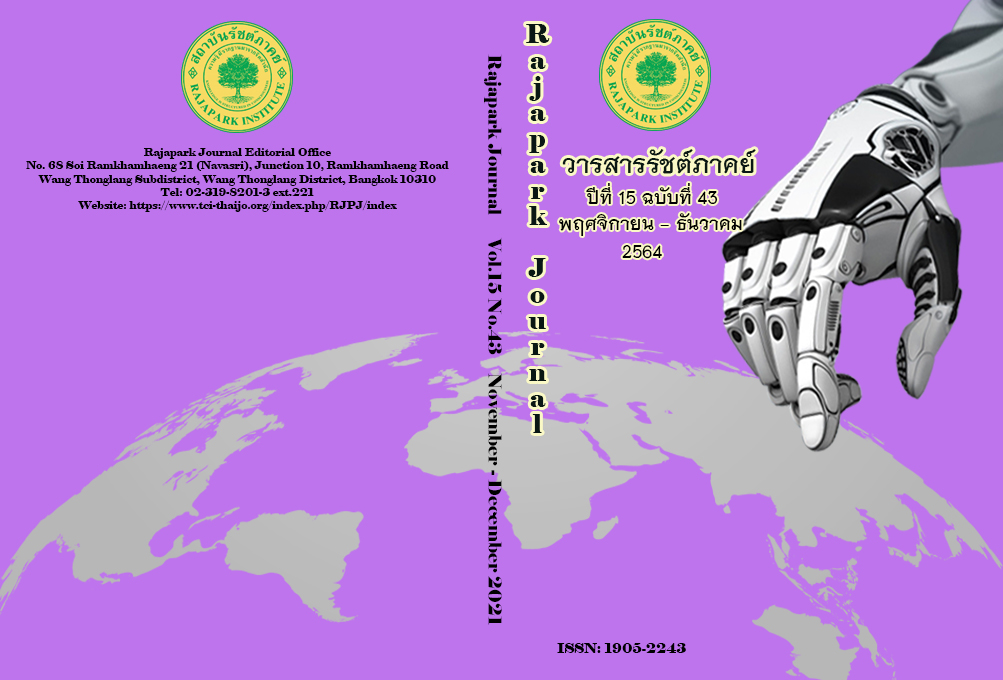The Use of Scaffolding Technique to Develop an English Composition Writing Skill of Undergraduate Students at Rajamangala University of Technology Phra Nakhon
Main Article Content
Abstract
This experimental study aimed to (1) compare the development and the retention of the English Composition writing of 3rd-year undergraduates majoring in English for International Communication at Rajamangala University of Technology Phra Nakhon (RMUTP) before, after, and without the use of scaffolding technique; and (2) compare the English Composition writing of 3rd-year undergraduates in both experimental taught by the use of scaffolding technique and control groups taught by a regular teaching method. 66 samples were randomized to both experimental and control groups equally based on their writing levels. The research instruments were the lesson plans on English composition, the English composition tests, writing rubrics, and interview forms. The statistics used to analyze quantitative data were mean, standard deviation, repeated measured One-Way ANOVA, and content analysis. The result revealed that those in the experimental group had a greater mean score on the posttest on English composition writing than the mean score on the pretest. Without treatment for a month, their mean score of the without-treatment test was lower than their mean score of the posttest. Moreover, those in the experimental group had a greater mean score on the posttest than those in the control group. Without treatment for a month, those in the experimental group had a greater mean of without-treatment test of English composition than those in the control group at a .05 significant level.
Article Details
Views and opinions appearing in the Journal it is the responsibility of the author of the article, and does not constitute the view and responsibility of the editorial team.
References
Bowornwattanase, C. (2016). Instructional Strategies Based on Scaffolding Theory. Prae-wa Kalasin Journal of Kalasin University, 3(2), 154-179.
Butler, L. (2014). Longman Academic Writing Series 1: Sentences to Paragraphs (2nd ed.). USA: Pearson Education.
Chinnawongs, S. (2000). A Study of the Writing Ability of EAP Science Students. PASAA PARITAT, 18, 10-27.
Erbsuksiri, A. (2014). Psychology for Teachers. (2nd ed.). Bangkok: Chulalongkorn University Press.
Manphonsri, S., Phusawisot, P., & Samdaengdej, K. (2013). Reducing Thai High School Students’ Writing Apprehension by Exploiting an Instructional Model Based on Vygotsky’s Scaffolding Techniques. Rajabhat Mahasarakham University Journal, 7(2), 31-42.
Paladkong, P. (2018). Scaffolding Technique: Knowledge and Application on the Context of Thailand Higher Education. Association of Private Higher Education Institutions of Thailand Journal, 24(1), 117-128.
Pansue, S. (2008). Use of Scaffolding Strategies to Promote Writing Ability and Decrease Writing Anxiety of Expanding Level Students(Master of Education, Teaching English).Chiangmai University.
Pinchai, P. (2016). Using Scaffolding Strategies in Teaching Writing for Improving Student Literacy in Paragraph Writing. Journal of Education Thaksin University, 16(2), 43-51.
Rajamangala University of Technology Phra Khon. (2021). English for International Communication Program. Retrieved May 25, 2021, from https://www.rmutp.ac.th/
Rungsiyakull, P. (1993). Linguistics and writing I. Bangkok: Ramkhamhaeng University Press.
Rungsiyakull, P. (2008). Linguistics and writing 2. Bangkok: Ramkhamhaeng University Press.
Rungwaraphong, P. (2014). Problems in Writing English of the New-entry University Students: A Case Study of Prince of Songkla University, Trang Campus. Rajabhat Maha Sarakham University Journal, 8(3), 119-126.
Sokolik, M. (2003). Writing. In Nunan, D. (Eds), Practical Language Teaching (pp. 87-108). Singapore: McGraw Hill.
Soratat, K., Phusawisot, P., & Prapan, P. (2016). Development of Basic English Writing Ability of First-Year Students at Rajamangala University of Technology Isan Using the Theme of Vygotsky’s Scaffolding Techniques. Prae-wa Kalasin Journal of Kalasin University, 3(3), 113-128.
Spratt, M., Pulverness, A., & Williams, M. (2007). The TKT Teaching Knowledge Test Course (4th ed.). UK: Cambridge University Press.
Sriwichai, S. (2006). Implementation of Top-level Structure and Scaffolding Strategies to Promote English Reading Comprehension and Writing Ability(Master of Education, Teaching English as a Foreign Language). Chiangmai University.
Sujaree, T., Sintoovongse, K., & Rujikietgumjorn, S. (2010). Development of an English Reading Comprehension Instructional Model through Scaffolding Reading Experience Strategies. Rajabhat Maha Sarakham University Journal, 4(3), 67-76.


